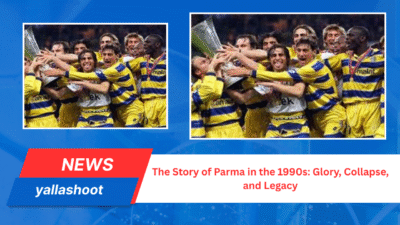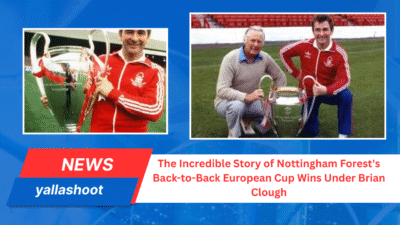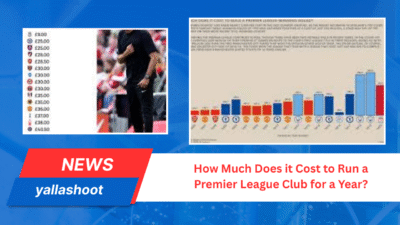Have you ever wondered why some football stories transcend generations and remain etched in memory forever? The Leeds United Champions League Run of 2001 is one of those timeless journeys that fans, pundits, and historians still talk about today. It wasn’t just about results on the pitch—it was about passion, belief, and a club daring to dream against the odds.
What made this run so special? Was it the electric Elland Road atmosphere that unsettled Europe’s giants? Was it the rise of future stars like Rio Ferdinand and Harry Kewell, who lit up the stage with fearless performances? Or was it the simple fact that a team, once considered outsiders, went toe-to-toe with the very best clubs in the world?
Looking back, the journey feels almost mythical, a reminder of when Leeds United stood among Europe’s elite. This campaign not only brought unforgettable nights under the floodlights but also left an enduring legacy that continues to inspire football romantics worldwide. To truly understand its significance, let’s rewind to the beginning of this remarkable story.
Why the Leeds United Champions League Run Still Matters
The 2001 campaign holds a unique place in football history. Leeds United’s European adventure wasn’t just about reaching the semifinals—it was about defying expectations. In an era dominated by clubs with bigger budgets and star-studded squads, Leeds dared to challenge the status quo.
Fans still recall the deafening roar of Elland Road, the fearless energy of young talents, and the way the team embodied the city’s fighting spirit. Beyond the results, this run symbolized resilience and ambition, two qualities that continue to define Leeds’ identity today.
It’s no exaggeration to say that the run remains one of the most famous Champions League campaigns ever staged by an English club.
The Road to Europe: How Leeds United Secured Their Spot
1.The Premier League Finish That Opened the Door
Leeds entered the 2000-01 season after an impressive domestic showing. Finishing just outside the top spots, they earned a pathway into Europe. It was a significant milestone, proving the club’s progress under David O’Leary.
2.Building a Squad for European Glory
The squad combined youth with experience. The likes of Rio Ferdinand, a record signing, brought defensive steel, while players such as Harry Kewell added attacking flair. The balance of grit and creativity would prove essential in navigating Europe’s toughest tests.
Group Stage Drama: Making a Statement Against Europe’s Best
Early Setbacks and Strong Comebacks
The campaign began with challenges, but Leeds quickly found their rhythm. They faced European powerhouses, yet displayed fearless football that earned admiration across the continent.
The Famous Elland Road Atmosphere
Elland Road became a fortress. Visiting teams struggled under the pressure of fans who believed every match could be historic. This atmosphere was more than just noise—it was an undeniable advantage that carried the team forward.
Quarterfinal Glory: Defying the Odds
Rio Ferdinand’s Rise as a Defensive Leader
Ferdinand, signed from West Ham, became the defensive rock. His leadership at the back and composure on the ball elevated Leeds’ performances, showcasing why he was destined for greatness.
Harry Kewell and the Creative Spark
Kewell’s dribbling, vision, and flair made him one of the standout performers of the campaign. His contributions in key matches kept Leeds competitive against Europe’s finest.
The Semifinal Clash with Valencia
First Leg Tensions at Elland Road
The semifinal first leg ended in a stalemate. Leeds fought bravely, with the fans urging them on. But the task remained daunting as they prepared for the return leg in Spain.
The Decisive Night in Spain
The squad combined youth with experience. The likes of Leeds United stars Rio Ferdinand, a record signing, brought defensive steel, while players such as Harry Kewell added attacking flair. The balance of grit and creativity would prove essential in navigating Europe’s toughest tests.
Key Figures Who Defined the Campaign
David O’Leary’s Tactical Vision
O’Leary’s ability to motivate and organize his players was central. He instilled belief in a young squad and guided them through the intense European journey.
The Role of Emerging Young Talent
Beyond stars like Ferdinand and Kewell, players such as Alan Smith and Mark Viduka contributed vital moments. Together, they formed a squad greater than the sum of its parts.
Comparing Leeds’ Journey to Other Famous Champions League Campaigns
Lessons from Historic Underdogs
Like Ajax in the mid-1990s or Monaco in 2004, Leeds embodied the underdog spirit. Their campaign reinforced the idea that passion and belief can challenge financial dominance.
How Leeds Inspired Future English Clubs
Clubs such as Chelsea and Liverpool, who later enjoyed European triumphs, drew inspiration from the resilience shown by Leeds in 2001.
Legacy of the Leeds United Champions League Run
Impact on the Club’s Finances and Future
While the run was glorious, the financial risks taken to build the squad eventually caught up with the club. Leeds entered a turbulent period soon after, a sobering reminder of football’s fragile economics.
Why the 2001 Run is Still Remembered
Despite the aftermath, the run remains a cherished memory. It symbolizes hope, ambition, and the magic of European nights under the Elland Road lights.

Frequently Asked Questions
Q1: Who were the standout players in the Leeds United Champions League Run of 2001?
A1: Rio Ferdinand, Harry Kewell, Alan Smith, and Mark Viduka were among the key performers.
Q2: How far did Leeds United reach in the 2001 Champions League?
A2: Leeds reached the semifinals, where they were eliminated by Valencia.
Q3: What role did Elland Road play in Leeds’ campaign?
A3: The atmosphere at Elland Road was pivotal, often overwhelming visiting teams and inspiring Leeds to memorable victories.
Q4: Why is this campaign considered one of the famous Champions League campaigns?
A4: Because Leeds, as underdogs, went head-to-head with European giants and made it to the last four, defying expectations.
Q5: Did the run have a long-term effect on Leeds United?
A5: Yes, financially and structurally, the club struggled afterward, but the memories of 2001 remain a proud part of its history.
Conclusion: Remembering Leeds’ European Dream
The Leeds United Champions League Run of 2001 was more than a football campaign—it was a story of ambition, unity, and resilience. From the roar of Elland Road to the brilliance of Rio Ferdinand and Harry Kewell, every moment added to a legacy that still inspires today.
Though Leeds faced struggles in the years that followed, this journey ensured the club’s name would forever be mentioned among Europe’s most courageous challengers. It remains a reminder of what football is truly about—the power of belief, the passion of fans, and the unforgettable magic of European nights.










